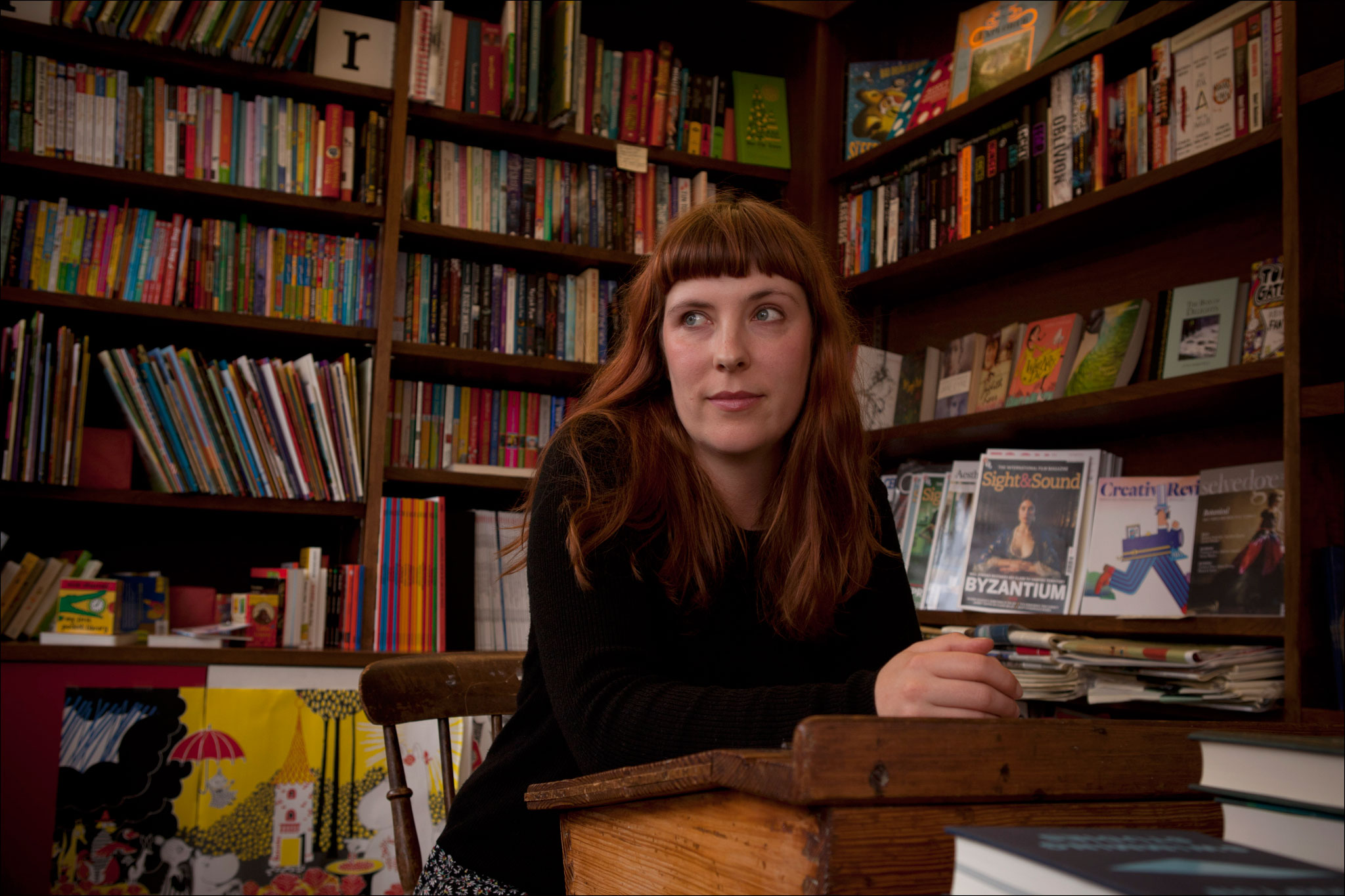Evie Wyld is most recently the author of All the Birds, Singing.
Author: Evie Wyld
Listen: Play in new window | Download
Subjects Discussed: The Call of the Wild as workplace novel, the stability of work in wild environments, physical labor and working in bookstores, coming from a family with a farming background, the engineering mindset, the virtues of being a messy writer, the interest in what we hold back, having to write moments that aren’t revealed to the reader, the dangers of creative pride, how to organize a messy 60,000 words on a floor using scissors and tape, structure and certainty, hating your book, attempts to write linearly and literally, the virtues of an innate rebellious streak, when flashbacks become integral to structure, the many insects within Wyld’s fiction, how horror films are more willing to dramatize the relationship between humans and animals, Jeffrey Lockwood’s The Infested Mind, entomophobia and Western culture, why sharks are misunderstood, Australian insects, Holiday Cigarettes, the autonomy of smoking, attempts to find control over your environment, kangaroos hit by utility trucks, appreciating life by confronting death, why kangaroos are mutinous, dogs vs. kangaroos, animals and social projection, sheep, when kangaroos stop being cute, pet kangaroos, when giving a character a job is the hardest part of fiction, sheep shearing pubs, farming pubs, sheep integrity, Ernest Hemingway, Robert De Niro and Method writing, imagination vs. process writing, getting bogged down in research, notes and memory, characters with palindromic names, bidirectional retreats to the past, how to get around writing boring scenes, romantic notions of writer’s block, why it’s important to write drivel, thinking on the page, despising the manuscript and knowing the moment when it needs to be plucked away, happy nightmares, families of solitary figures, eccentric exercise regimens, the back as a footstool, sheep killing as an ambiguous mystery, the Pulp Fiction briefcase, the appeal of monsters, the pros and cons of setting up reader expectations with a mystery, Stephen King’s It, disappointing endings, why seeing the monster isn’t relevant in storytelling, narrative entitlement, how novelists contend with increasing reader distractions, Arnold Schwarzenegger, the Venn diagram of genre and literary fiction, the advantages of working as a bookseller, Richard Flanagan’s The Narrow Road to the Deep North, Wyld confronting her dead father’s records in the bookstore database, having a healthy suspicion of lists in a BuzzFeed age, Keith Richards’s Life, and the benefits of accidents and coincidences.
EXCERPT FROM SHOW:
Correspondent: I had a rather strange way of entering this rather raucous novel. About three years ago, another critic Matthew Battles and I, we were having this online conversation about The Call of the Wild. And we were both arguing that Jack London’s great novel was actually a workplace novel. Because Buck, he’s forced to contend with the aggressive cubemate, like Spitz, and essentially he has to find individualism and this independent work ethic over the course of his journey. Your book happens to involve two dogs — one of them actually named Dog — and Jake has to learn sheep shearing and driving skills during her journey. Why do you think work became such a dominant part of this novel’s fixation in your efforts to contend with these rather feral environments, both in Australia and in England?
Wyld: Well, I think work is a way of normalizing yourself. It’s a way of getting yourself away from the stuff that’s actually happening in your life. A way of processing it. So I think for Jake, handling sheep is very much who she is. She expresses herself through wrestling with sheep and trying to keep them alive. And she tries to kind of make amends for some of the things in her life by working really, really hard and working very hard at looking after these sheep, trying to keep them alive, failing a lot of the time.
Correspondent: Why do you think it’s tied so much into the idea of existing in this kind of wild environment? That’s the real question. Why work is the defining quality of a naturalistic environment.
Wyld: I think it keeps you sane in some sense. I mean, I certainly find. that lives in the wilds of Peckham, where I am in London, I work very, very hard in the bookshop and I work very hard at writing novels. And I think it’s something to do with, as long as you’re working hard, you feel you’re existing in a way that is worthwhile, in a way that you feel like — sometimes you can feel like you’re very transient and that you’re slightly floating above the earth and you’re not really experiencing anything. And you find that if you actually do something physical to kind of make your mark on the earth, then it has a calming effect, I find.
Correspondent: Do you feel that there’s any difference between working in the wild of a bookstore and working in the rather saner, urban environment of sheep shearing?
Wyld: I think probably a fair amount of difference. I think I really admire physical work. I would love to…
Correspondent: How much physical work have you done?
Wyld: Well, I’ve done absolutely no sheep shearing. I don’t know how physical bookselling is. I lift the books.
Correspondent: It is pretty physical. I mean…
Wyld: Stacking shelves.
Correspondent: Stacking.
Wyld: Dusting. The whole lot.
Correspondent: Moving shelves for author events.
Wyld: Wrestling the odd shoplifter to the ground. That sort of thing. But, yeah, I think my mother’s family are Australian and they’re farmers. So it’s always been something that I have looked on with envy and amazement, really. This amazing, quite masculine work. Actually growing stuff. Actually keeping something alive.
Correspondent: Why didn’t you decide to enter the farming racket?
Wyld: Not sure I’m that talented, to be honest. My Australian family aren’t big readers or big intellectual kind of thinkers. But somehow they’re some of the most intelligent people. They can look at a broken tractor and they can fix it. And I find that incredible. And I don’t have that skill. I don’t have the maths, I think, mainly.
Correspondent: The sort of engineering brain to look upon some casual thing to fix and then you’ll be able to find a solution through a MacGyver situation by putting it back together.
Wyld: Put some oil on it. (laughs)
Correspondent: Yeah. Exactly. Well, the novel here is built on a series of alternating chapters. It’s almost this two-lane highway. You have this forward motion in the present and you also have these backwards chapters that depict Jake’s past. I’m wondering how this structure emerged, first and foremost. But how much of Jake’s background did you plan out in advance or come to know in the act of writing? Just to start off here.
Wyld: Well, I’m a very messy writer.
Correspondent: You need structure.
Wyld: Yeah. I tend to start in the middle and kind of work outwards.
Correspondent: Okay. So you just write all over the place.
Wyld: I just write all over the place and then I get to a point where I’ve written a certain amount of words. And I try and find what the story is, what the arc of the story is. So mostly for me the writing process involves getting to know the character. And for me, that involves their childhood, their family. It doesn’t always enter into the story in the end. But it’s central to me that I can’t understand who someone is unless I know about them before the sort of now of the book. So I’d written about 60,000 words. About a third of the book. Maybe half the book. And then I just realized that I was enjoying her as a character and I was enjoying her life in Australia and in the UK. But it was lacking tension. And there was just something really to be gained by folding it over on itself. And I’m a big fan of playing around with structure, only in terms of furthering the story, only in terms of not just for fun but because it’s so exciting to me when you have two objects that shouldn’t go next to each other and they create a third feeling.
Correspondent: Yeah. Did you find that your sense of Jake deepened when you had this structure in place? That you knew here even more intimately than you could ever possibly anticipate knowing?
Wyld: Yeah. I think so. I think there’s something about somebody who is trying very hard not to think about something that appeals to me and that makes me feel that they’re much more human.
Correspondent: It allows you to get outside of your own head.
Wyld: Exactly.
Correspondent: Because you’re sort of a cerebral person and you need something who isn’t a cerebral person to escape to.
Wyld: Yeah. I think there’s definitely something to be said for the things we hold back. I think they’re more interesting than the things we say a lot of the time.
(Loops for this program provided by danke, ozzi, and 40a. )
The Bat Segundo Show #543: Evie Wyld (Download MP3)


